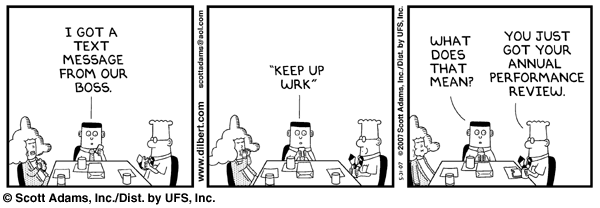Want to give thanks this week for a tip about performance reviews? Here it is.
Turn the darn things on their head, shake them and see what falls out.
Root around in the pile of rubble. By this time of year in many companies, forms are long finished, reviewed and approved. So you’re not going to find self appraisals, competency assessments or even ratings in the pile.
But you will find fingerprints on the debris, and here’s where we get to my point:
What do reviews say about the reviewers?
How often do we look at performance reviews to find out what they tell us about the people who sign them? You know, the managers and executives who lead this deeply personal and utterly necessary assessment of our company and its people?
There’s lots to learn about their communication skills — just take a look at the comments on the forms.
Insightful? Specific? If they can’t give employees feedback in writing that will help them change or continue behavior, how well can they be doing it verbally throughout the year?
How about managers’ commitment to employee development? Many managers struggle with the competency section found in performance review forms.
But, really, this has been going on for over 20 years. It could easily be the form design, but how about the human factor?
Some other questions to ask about performance appraisals
Do you know if your managers really do coach employees on communications, team work, customer service and other competencies that clearly contribute to professional abilities? Have your managers ever had a chance to learn how to coach?
Want insight on the level of engagement in a department? How well were the employees’ self-assessments completed? Were they on time? If an employee challenges a performance rating, how often do you check to find out if this has happened to the manager before?
Do I need to mention the link between effective objective setting and business strategy?
Poor objectives may come from lack of discipline and time, as we often believe. But if we’re really being truthful, they also derive from managers’ inexperience with metrics. If your company is focusing on efficiency or margin, for example, I’d be concerned if my managers (and the employees they guide) didn’t shine at the objective setting process.
Few companies consider performance reviews a leadership development exercise. Imagine how differently you would handle it if you did.
2014 anyone?
This was originally published at the Compensation Café blog, where you can find a daily dose of caffeinated conversation on everything compensation.
